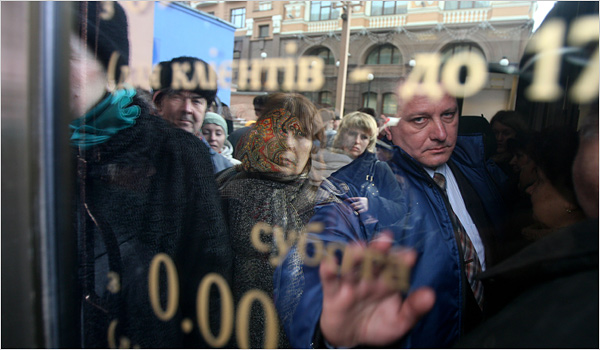
Ukranian citizens line-up to withdraw funds from bank.
By CLIFFORD J. LEVY writing for the New York Times
http://www.nytimes.com/2009/03/02/world/europe/02ukraine.html?ref=world
KIEV, Ukraine — Steel and chemical factories, once the muscle of Ukraine’s economy, are dismissing thousands of workers. Cities have had days without heat or water because they cannot pay their bills, and Kiev’s subway service is being threatened. Lines are sprouting at banks, the currency is wilting and even a government default seems possible.
Ukraine, once considered a worldwide symbol of an emerging, free-market democracy that had cast off authoritarianism, is teetering. And its predicament poses a real threat for other European economies and former Soviet republics. The sudden, violent protests that have erupted elsewhere in Eastern Europe seem imminent here now, too. Across Kiev last week, people spoke of rising anger about the crisis and resentment toward a government that they said was more preoccupied with squabbling than with rallying the country.
The sign held by Vasily Kirilyuk, an unemployed plumber camped out with other antigovernment demonstrators here in the past week, summed up the pervasive frustration: “Get rid of them all,” it said. Mr. Kirilyuk did not hesitate to take that further. “There will be a revolt,” he said. “And people will come because they are just fed up.”
Mr. Kirilyuk, 29, was standing in the same central square where throngs in 2004 carried out the Orange Revolution, a seminal event that brought to power a pro-Western government in Ukraine. He said he was a fervent supporter then of the protesters, but now he and a few dozen others who have set up tents here are demanding that the heroes of that revolution step down.
It is not hard to understand why world leaders are increasingly worried about the discontent and the financial crisis in Ukraine, which has 46 million people and a highly strategic location. A small country like Latvia or Iceland is one thing, but a collapse in Ukraine could wreck what little investor confidence is left in Eastern Europe, whose formerly robust economies are being badly strained. It could also cause neighboring Russia, which has close ethnic and linguistic ties to eastern and southern Ukraine, to try to inject itself into the country’s affairs. What is more, the Kremlin would be able to hold up Ukraine as an example of what happens when former Soviet republics follow a Western model of free-market democracy.
“Ukraine is a linchpin for stability in Europe,” said Olexiy Haran, a professor of comparative politics at Kiev Mohyla University. “It is a key player between the expanding European Union and Russia. To use an alarmist scenario, you could imagine a situation in Ukraine that Russia tried to exploit in order to dominate Ukraine. That would make for a very explosive situation on the border of the European Union.”
That Ukraine can cause problems for Europe was highlighted in January when Ukraine engaged in a dispute with Russia over how much it would pay Russia for natural gas, as well as over gas transport to the rest of Europe. The Kremlin shut off the gas for several days, and some European countries went without heat. The Kremlin also shut off gas to Ukraine in 2006 in a pricing dispute.
While Ukraine’s economy is dependent on exports of steel and chemicals, which have plummeted, the crisis has cut deeply because people are disillusioned with the government.
President Viktor A. Yushchenko, a leader of the Orange Revolution, who garnered attention around the world in 2004 when his face was scarred in a poisoning episode, is so widely scorned that a recent poll found that 57 percent of people wanted him to resign.
His rivals have also lost popularity, as the public has become exasperated by years of political bickering. In February, the International Monetary Fund refused to release the next installment of a $16.4 billion rescue loan to Ukraine because the government would not adhere to an earlier agreement to pare its budget. Around the same time, Ukraine’s finance minister resigned, saying that the job had been “hostage to politics.”
On Friday, the monetary fund projected that Ukraine’s economy would shrink by 6 percent this year, and said that it was continuing to work with the government to find a way to disburse the rest of the rescue loan.
At a branch of the Rodovid Bank across town, a tense crowd gathered Friday morning. The bank, close to failing, was allowing withdrawals of only $35 a day. And so people, some of them pensioners fearful for their life savings, have been trooping each day, ever more aggravated, to try to get what they can. “Every day we come here — it’s insulting — in the cold and line up,” said Alevtina A. Antonyuk, 58, an engineer. “They are nothing at this bank but a bunch of thieves…”
For more on this topic, see the following Forebes magazine article, Will The Economic Crisis Split East and West in Europe?: http://www.forbes.com/2009/02/25/eastern-europe-eu-banks-euro-opinions-columnists_nouriel_roubini.html